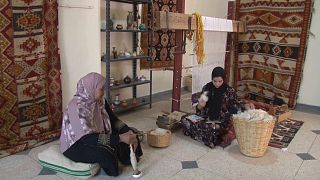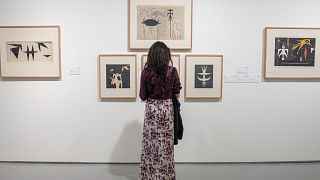Morocco
In the south of Morocco's High Atlas mountains is one of the few palm tree oases still inhabited in the country.
Over 25 square kilometres, the Skoura oasis features palm trees of course, but also olive and almond trees.
The 20,000 residents live amongst nearly 140,000 palm trees.
Founded in the 12th century during the Almohad Caliphate, a North African Berber Muslim empire, it was inhabited by the Haskourene Berber tribe, hence the oasis name Skoura.
Residents of the oasis live from the produce they grow on the land, mainly date palm, but they're suffering from the effects of climate change.
Most of the palm trees are dried and damaged, and the soil bears the cracks of water scarcity.
"Today, we notice the great impact of climate change on the oasis of Skoura, as the scarcity of water has led to a shrinkage in the afforestation circle in the region. There is a shrinkage of palm trees, olive trees, henna cultivation, in addition to many products related to the economy of the region, and all of these products were destined for export, whether to northern Morocco or neighbouring countries," says Mustapha Laissate, president of Green Carpet Association in Rabat.
Mustapha Mafhoume has been working as a farmer in the oasis for the past 52 years. It's also where he was born.
"In the past, there were a large number of palm trees here in addition to olive, almond and apple trees, the area was prosperous, the merchants used to come here to get all the goods they wanted to buy, but recently it is not like before because there is no more water," he says.
Most of the oases in Morocco are supplied with water by Khattara, an irrigation system of subterranean canalisations that make it possible to drain groundwater and bring it to plantations thanks to gravity.
Skoura has been using the Khattara irrigation system since 1980, but most of it has since dried.
"In the past, the source of water was the Khattara system (underground traditional irrigation system), but now the farmers are forced to dig wells and this is what caused problems between them and this is what made none of them benefit from the required water. Water is very necessary for us. For this field, I made a great effort to reach this result. I tried several times to dig wells to be able to find water. All this is in order to stay here. We cannot go anywhere else. Where will we leave our land?" says Mafhoume.
Wells need to be dug at least 40 metres into the ground to reach water.
Several square kilometres of the oasis have disappearedbecause of dried palm trees.
Tourism helps the local economy to stay afloat for now, but the locals are not staying.
"Since the beginning of the 2000s, there have been many migrations of the residents of this oasis, many young people migrated, including the neighbours and my brother as well. I did not think about emigrating due to the connection to the land and I have an ambition to stay here and encourage young people to stay in order to develop and improve the oasis because here is where we live," says Abdelkabir Houkari, president, environment association of Skoura.
Morocco had an estimated 14 million palm trees -- and lost two-thirds of them over the last century, according to official sources.
Reaching up to 30 metres in height, palm trees have died because of droughts, getting stuck in the sand, and diseases. But that's not all.
"Morocco suffers to a significant degree from a decrease in the percentage of oases due to the high fires, the high temperature and the lack of water resources, and all this is due to climatic changes, which directly threatens the ecosystems of the oases," says Laissate.
Oases cover about 15 percent of the Moroccan territory.
"In the near future, we will know the migrations of a large part of the population towards areas where there is water and arable lands, especially if there is not a quick intervention to save these areas from desertification and expand the circle of oases," says Laissate.













01:22
World will have to learn to live with heatwaves, UN says
01:15
Morocco says 2024 was the hottest year with temperatures reaching 47.7 degrees
00:24
Greenland and Iceland saw record heat in May
01:30
Macron sparks global push to protect oceans
01:06
Experts warn of an increase in Glacier-related risks from climate change
01:39
Hundreds dead and missing after Nigerian town submerged by floods